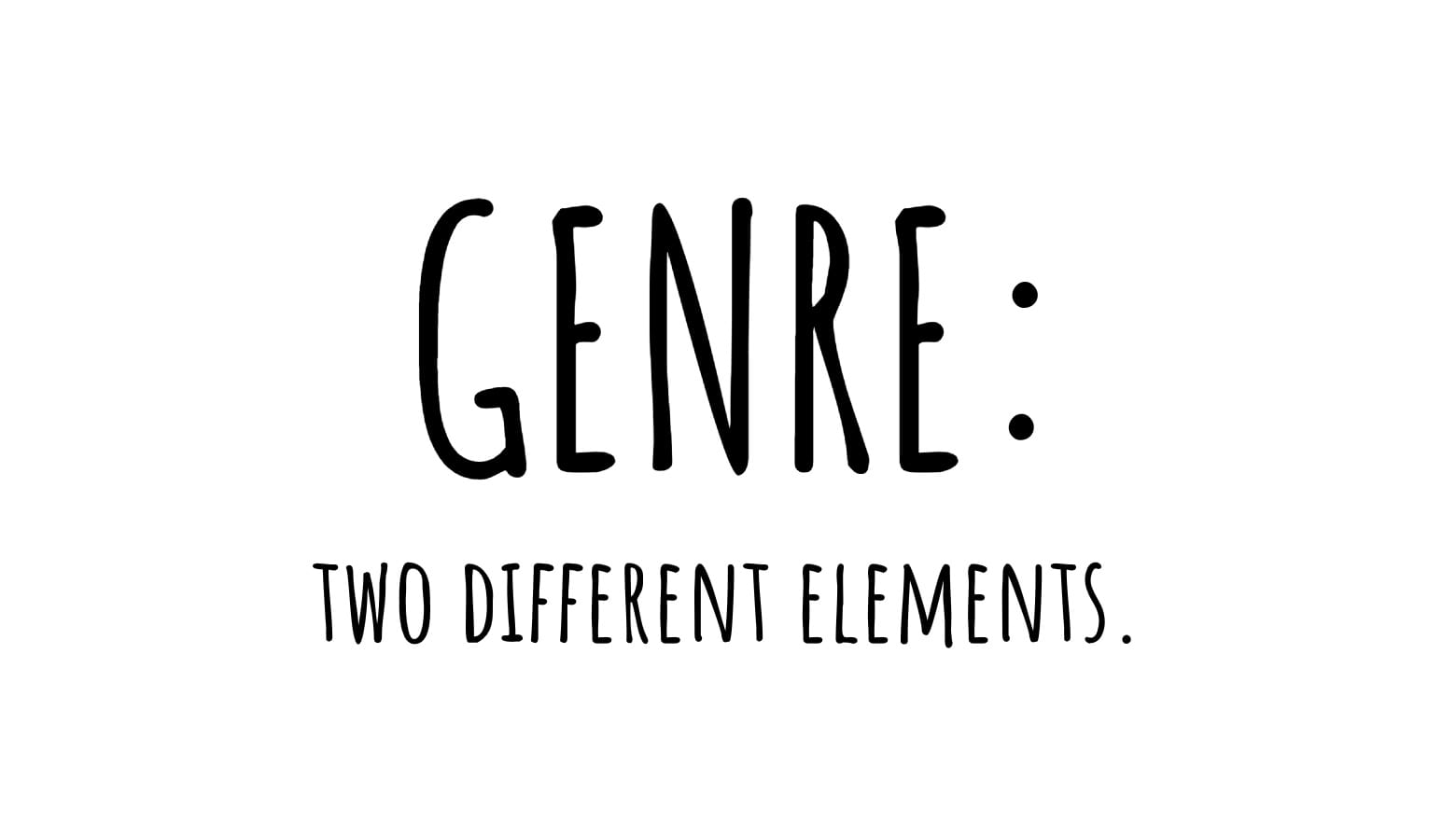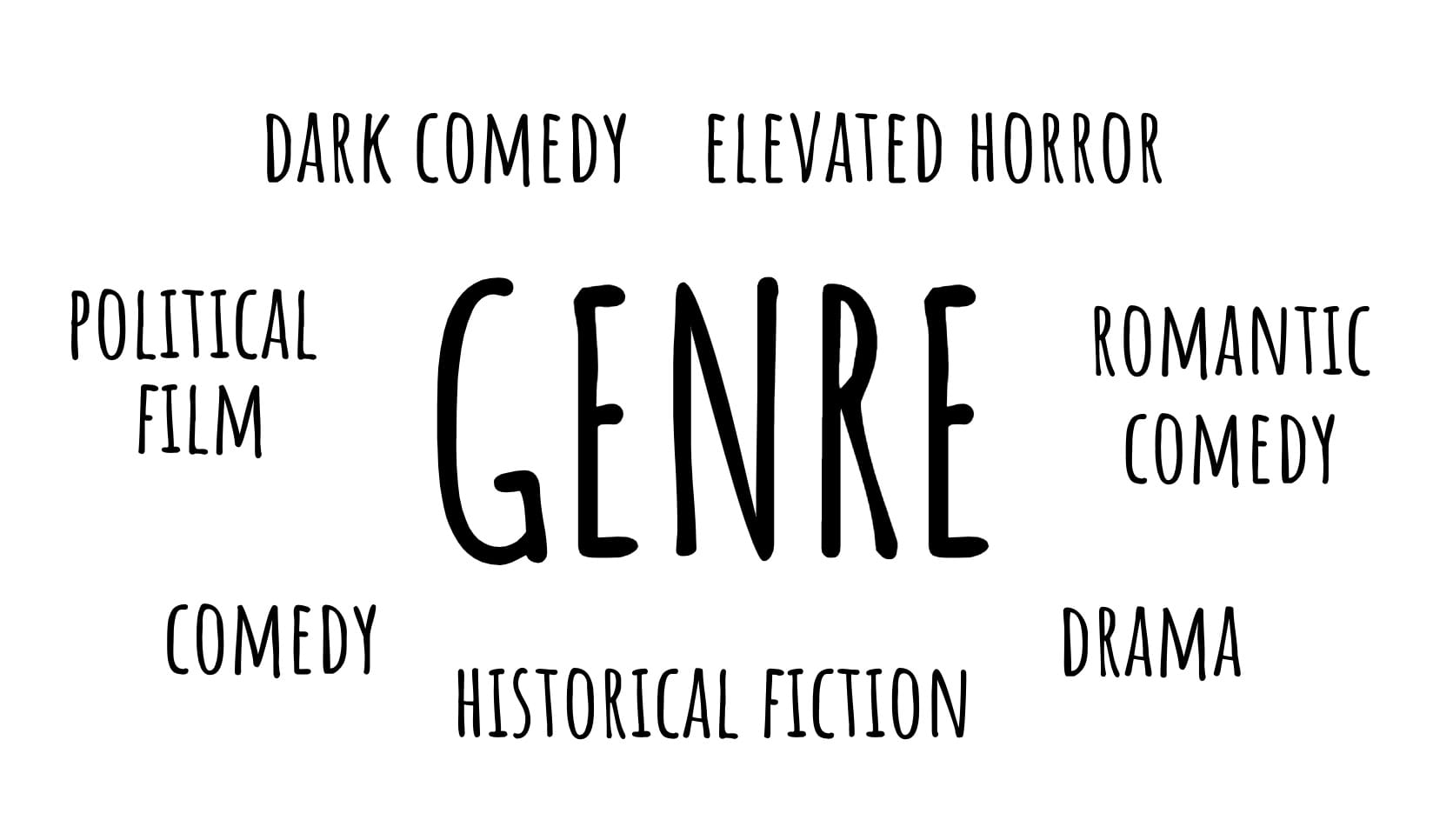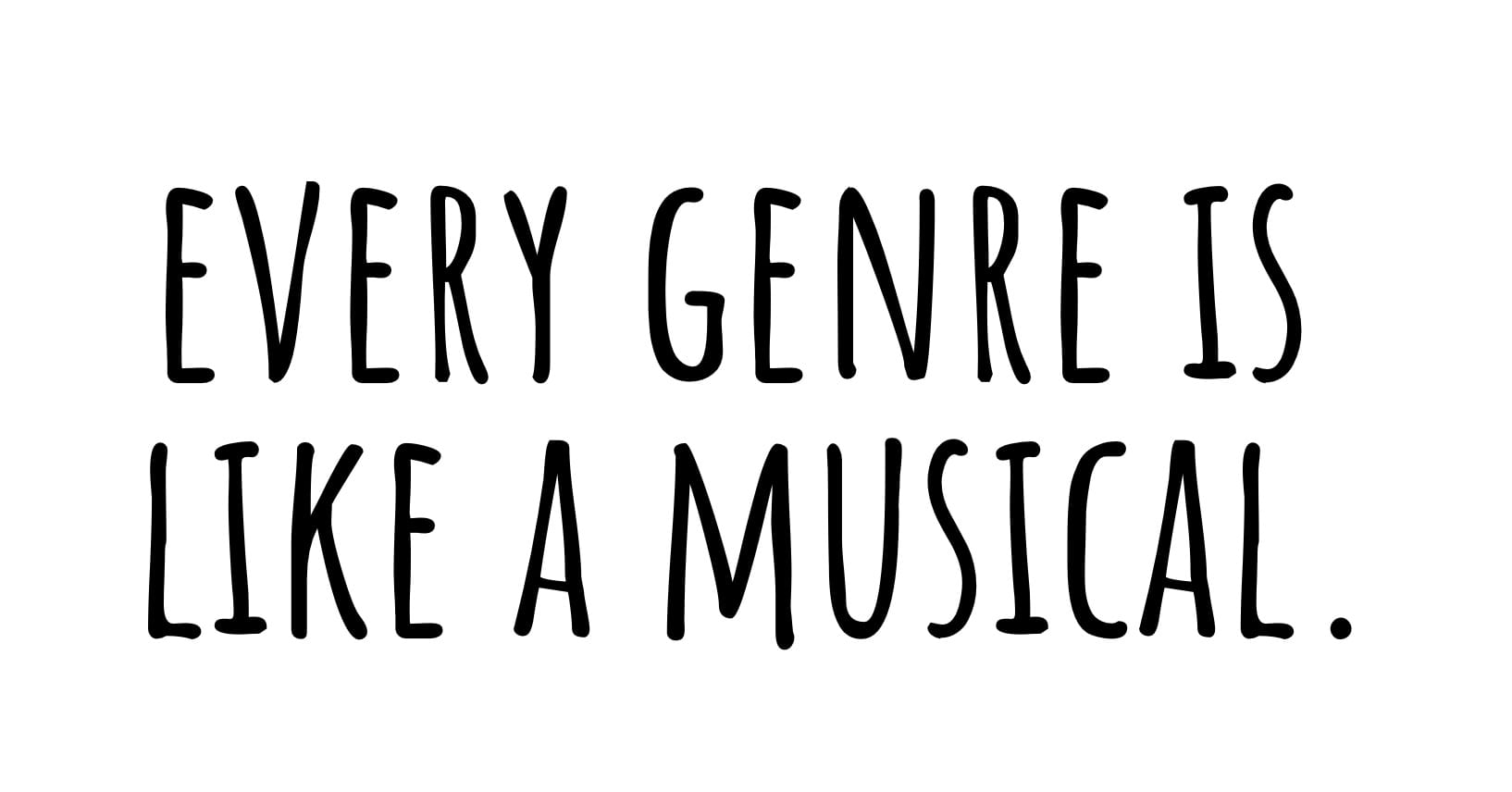Every Genre Is Like a Musical
This week, we’re going to be talking about writing genre movies and TV shows.
We’re going to be talking about writing the horror genre, and writing elevated horror.
But we’re also going to be talking about writing any kind of feature film or TV show, or even a play, comic or novel that has strong genre elements.
The truth is, every film and every show, every work of art for that matter, has a strong genre element.
Whether you’re writing an action movie, an action comedy or a romantic comedy, a musical, or even a little low-budget indie drama, there is always a genre element.
If you think of a Wes Anderson movie, for example, the genre element is that Wes Anderson movie is cool, hip cuteness, the odd characters, and the really beautiful tableaus: that’s the Wes Anderson genre.
Or, if you think of a writer like Charlie Kaufman, even though he seems to defy genre, he has his own genre as well. Generally, in his early work, he’s writing inside of a romantic comedy genre. But it’s also going to have that mind-bending quality to it, it’s going to make you laugh, and it’s going to have some hidden darkness underneath the surface.
You can see that Charlie Kaufman’s genre changed as he evolved in his career when he stopped working with Spike Jonze, and the darkness that used to be hidden under the humor emerged onto the surface. In films like Synecdoche New York or Anomalisa, the mind-bending Charlie Kaufman elements are still there, but the darkness rises to the surface and the romantic comedy elements disappear.

So what are we really talking about when we talk about the genre in screenwriting? Essentially genre is made up of two different elements.
The first element is the way that your movie or show makes the audience feel.
Every audience goes to a movie or binges on Netflix for the exact same reason that you do. They want to feel a certain way.
Perhaps they want to feel like love is possible. They’re going to show up and watch a romantic comedy or a romance because it’s going to make them feel that way.
Or maybe they want to feel an adrenaline rush. They might show up for your action movie, or a noir thriller to get that kind of adrenaline rush.
They might want that sci-fi or fantasy experience, that feeling of experiencing other worlds that both allow us to escape and better understand our own.
They might be coming for a feeling of violence and action. They might be coming for a feeling of adventure. They might be coming for a feeling of connection and understanding. They might be coming for a feeling of being challenged creatively.
Your audience is always coming to a movie or TV series for a genre feeling. And if you don’t deliver that feeling, the audience is going to be pissed off.
If you’re writing BoJack Horseman (see my podcast on BoJack Horseman) and you don’t deliver 500 puns a minute (and then every once in a while make us cry), we’re going to be pissed off.
If you’re writing Curb Your Enthusiasm and you don’t make us laugh at the little eccentricities of neurosis as Larry tries to get along in reasonable upper-class society, you haven’t done your job. And if Curb Your Enthusiasm ever made you cry, you’d be angry. Because that’s not the feeling you’re coming for.
The first element that we’re talking about when we talk about a genre is how the movie or show makes you feel.
That doesn’t mean that you should adjust the feeling of your show for your audience and it doesn’t mean that you can’t do cool mashups of genre feelings and genre elements. You certainly can.
For example, Parasite (see my podcast on Parasite) does a really interesting mashup of comedy, horror and political commentary. Get Out does the same thing.
Though we use these terms to simplify talking about genre, you’re not stuck writing a “drama,” “comedy,” “rom-com” or “thriller.” There are a million genres of feeling and a million kinds of mixes of feelings.
When I advise you to think about the feeling that your film or your show delivers, I’m not talking about selling out and trying to please some unknown audience.
Instead, think about the feelings you want to experience in what you’re writing.
Ask: what do I want to feel when I watch this? What do I want to feel when I write it? And how do I deliver that main feeling consistently?
It doesn’t have to be on every page. But you have found a way to keep coming back to that feeling and landing it.
In a comedy, this might be joke density. Going back into each page and just cramming it filled with jokes.
In a drama, this might be asking yourself: How many tears can I wrestle out of this? How many moments can I hit that really feel where we feel that power and pain of familial connection?
If you’re writing a horror/slasher movie, you might be asking yourself: how much blood can I land every seven pages or so? There had better be blood splattered everywhere. And you’d better be building tension.
If it’s a campy horror, you’d better be building that tension in a campy way.
And if it’s an elevated horror, then it’s about how you use horror to kind of get underneath the real feelings, of dramatic experiences in our lives.
If you look at a film like A Quiet Place (see my podcast on A Quiet Place Pt.1 and Pt.2), for example, the script is really about the horror of silence within families, the horror of not being able to say “I love you.” And what does that does when a father can’t communicate his feelings to his children? That is translated through this horror element. But underneath is a powerful story of a family in crisis.
When you’re thinking about capturing the genre feeling of your screenplay or pilot, starts by looking at what’s already there. What’s it already doing really well, whether that’s one feeling or a mash-up of feelings?
Ask yourself, How do I keep on delivering that feeling? And more importantly, how do I keep on doing that?
In a way, every genre in screenwriting is like a fireworks display on the Fourth of July.
What we want to do with each scene, each act, is to be building towards a crescendo. We want to be outdoing what came before, pushing that feeling even further, or pushing that mashup of feelings even further.
To recap: on the simplest level, when you think about genre, you don’t even need to think about elements. You can just think about feeling. And how are you delivering that feeling?
The second aspect of the genre is this: what are the elements that convey that feeling? What are the elements that the audience wants to see? In this way, every genre is like a musical.
I had the privilege, in my career, of getting to work with some of the really great musical composers. If you understand musicals, you can understand everything else about the genre in screenwriting.
This is how writing musical works:
You come up with a story and you write a script. Of course, you’re writing in collaboration with composers, but at this point, your screenplay or play looks pretty much like any other traditional writing.
Then, what the composers do is take your best dramatic scenes, steal them and turn them into songs!
They take the most compelling and powerful scenes. And they say No, no, no! That’s not going to be a scene anymore. That is now going to be an aria! That is now going to be a song.
What they’re really doing is they’re taking that dramatic content, and they’re translating it into a new genre.
You can think about this in the same way in your screenwriting.
Underneath every genre, comedy, historical fiction, drama, political film, romantic comedy, dark comedy, elevated horror, or whatever world you’re working in, is just a drama.
Underneath every genre is a story about somebody wh
o wants something, trying to get it as best they can, in the best way that they can do it: making mistakes falling flat, having an emotional experience.
Every story is a drama. Every comedy is a drama. If you handle Curb Your Enthusiasm in a slightly different way, it is a really disturbing drama about a guy who just can’t handle the world.
If you handle Arrested Development in a different way, it turns into Succession.
Underneath every genre is a drama, a story about characters, trying as best they can to get their wants and needs met and bouncing off each other in a way that creates torture and that creates change.
And then, on top of that genre, we apply tone, and we apply elements of the genre.
If you’re writing an action movie, don’t think of your action as something that happens in between the dramatic scenes. Instead, think of your action as something that happened inside of the dramatic scenes, a way of translating the dramatics.
Take the scene where they’re falling in love and turn it into an action sequence.
If you’re writing a heist movie, make it a heist sequence.
If you’re writing a horror movie, make it a horror sequence. M
ake it a monster in the house sequence.
If you are writing a comedy make it a funny sequence.
And if you’re writing a musical, make it a musical sequence.

I want you to think of this approach as applying genre on top of drama. It’ll help you because what often happens when we try to write a specific genre is that we get lost in the genre elements, and forget what those genre elements are supposed to do.
We forget that the elements alone are not a story. You can write the most exciting, inventive action sequence ever, if we don’t have the drama underneath, it’s going to feel boring.
You just can’t sustain a two-hour movie, or even episode after episode of a tv comedy or drama, simply on exciting action sequences, beautiful songs, or amazing costumes. We always need that drama underneath. It is always about drama.
If your scene happens to come to you with a genre element attached, great! Take it! Run with it! Do it!
But if much of the screenplay has come to you without the genre elements you and the audience are expecting, look first at your best scenes, and ask yourself, how could the dramatic action of the scene take place inside those genre elements? How could I translate the scene into a chase scene? Into a murder scene? Into a fight scene? How can I turn this dramatic element into the genre element?
Then look at that scene that you’ve just created and ask yourself: What made that scene work? How can I come back to those elements? How can I keep building upon and outdoing those elements that so that my script works both as a crescendo of the drama and also of the genre elements that generate the feeling we’re coming for?
In your early drafts, your genre elements may only exist in certain places. You might not be getting the most out of the genre of your screenplay. But as you rewrite, you want to be constantly coming back to get those genre elements into your writing.
Focus on those two elements of the genre:
What do you want to feel?
And what are the elements that are going to help you deliver that feeling?
What are the fireworks that you are building towards when you sit down to write your script? Those are going to be the same fireworks that other people are coming for.
And once you’ve thought deeply about all that, remember this: Sometimes we are wrong about our genre.
I’ll tell you a true story.
My very first play was called The Funeral. I was in college, so I needed people to understand:
#1: How serious of a writer I was.
#2: How dramatic and painful life was.
The play was called The Funeral and was really dark. And in the main role, I cast the darkest, most serious actor I could find (who went on to have a really amazing career).
At the last minute, he had to drop out of the reading of the play. I was in a panic. I called my friend Jay, who was a comedy actor. And I said, “Hey, man, I’m in so much trouble can you show up in an hour and read this for me?” And he said, “sure.”
But of course, he didn’t have time to read the play in advance.
And what Jay did was this: He played every line for comedy.
He played every line for comedy because he assumed nobody would ever cast him in a dramatic role!
He played every line for comedy. And he saved that play.
And he taught me something very important about tone and genre.
You see, I thought I had written a drama. But I wasn’t completely in control of my craft yet. In fact, I had turned up the volume so high on the drama, that without Jay’s comedic timing, the play actually wouldn’t have worked. It would have been too dark, too over the top, too much.
What Jay did, by finding all these amazing comedy riffs inside the piece, was allow the audience to let down their guard a little bit. To forget the play was going to hurt them. To open themselves up enough to actually cry at the end, because they didn’t have their defenses up against it.
I remember Jay came up to me afterward to apologize!
“I didn’t know it was a drama,” Jay lamented.
And I said, “Jay, I didn’t know it was a comedy.”
This guy saved my play. And he taught me something, which is sometimes the genre you think you’re writing is not what the piece actually wants to be.
So, instead of trying to impose your will on the piece, remind yourself, if you don’t already have a producer involved if there isn’t somebody already demanding this script who’s expecting specific genre elements, that the piece will communicate what it wants to be to you if you simply allow it to do so.
What does the piece want to be? What is already there? What are your best scenes? And how do you do more of that? How do you translate more of the scenes that are not already in that genre, into that genre?
That doesn’t mean every scene needs to be in the same genre. You can find lots of different elements, and you can find an undertow to go along with the big wave.
But every seven pages or so you want to make sure that you’re tending to that genre element that both you and your audience are coming for. You want to make sure you’re giving them the shiny, fancy stuff that they want.
Because if you do that, you can get away with nearly anything else.
If you’re writing A Quiet Place, and you manage to have really terrifying monsters, you can get away with both the absurdities of that piece (Like why don’t they live under the waterfall? Why does the newborn baby never cry?). You’ll be forgiven those little stretches.
But you can also get away with telling this quiet little story about the relationship between a dad and his kids, by cloaking it in the delicious candy of those genre elements.
If you give them the genre elements, you can get away with nearly everything. This doesn’t mean selling out. This means asking yourself what is already great, what the script already wants to be and then pushing toward that.
If this script has tremendous tension building, how can you push it toward those thriller elements?
If the script is about the shadows of distrust, how can you it toward noir?
If you already have amazing action sequences, how do you push those even further to create that crescendo?
If this is horror, how do you make it more horrifying? If this is supposed to gross you out, how do you make it grosser?
You want to push the genre to the furthest extent you can, not as an add-on to the scenes, but by taking out your very best moments and pushing them through that lens.
And if you do that, you will have a great time writing genre.
If you’re interested in our other screenwriting, TV writing, playwriting, or comics writing programs you can attend any class online from anywhere in the world!
If you want, you can even join us for free every Thursday at Thursday Night Writes where a guest and I cover a different screenwriting topic each week!
*Edited for length and clarity.




